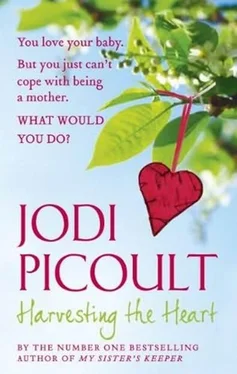“Well, you know,” I said, “we aim to please.”
Nicholas touched the baby’s open palm, and the fingers curled together like a daisy at sunset. “Four hours is damn fast for a first delivery,” he said.
The question died on my lips: Was this my first? Staring into the demanding face of this son, I thought that maybe, right now, it didn’t matter.
Nearby, Dr. Thayer was completing the medical record. “Last name, Prescott,” she verified. “Have you picked a first name?”
I thought of my mother, May O’Toole, and wondered if she knew in her corner of the world that she had a grandchild. I wondered if the baby might have her eyes, her smile, or her sorrow.
I turned my face up to Nicholas. “Max,” I said. “His name is Max.”

Nicholas went to Mass General to round his patients, and I was left alone with my baby. I held him awkwardly in my arms as he screamed and thrashed and kicked. I felt beaten from the inside; I couldn’t move very well, and I wondered if I was the best person for Max right then.
When I turned on the TV above the bed, Max quieted down. Together we listened to the wind shake the walls of the hospital as the reporters described a world that was falling apart.
At one point I found Max looking up at me, as if he’d seen the face before but couldn’t place it. I inspected him, his wrinkled neck and blotchy cheeks, the bruised color of his eyes. I did not know how this child could possibly have come out of me. I kept waiting to feel that surge of mother love that was supposed to come naturally, the bond that meant nothing could keep me from my baby. But I was looking at a stranger. My throat seemed to swell up with a pain more raw than childbirth, and I recognized it immediately: I just wasn’t ready. I could love him, but I had expected another month to prepare. I needed time. And that was the one thing I would not have. “You should know,” I whispered, “I don’t think I’ll be very good at this.” He placed his fist against my heart. “You have the upper hand,” I told him. “I’m more afraid of you than you are of me.”

At Brigham and Women’s, one of the options for new mothers was partial rooming-in. The baby could stay with you all day, and at night when you were ready to go to sleep, a nurse would roll the plastic bassinet to the nursery. If you chose to breast-feed, a nurse would bring the baby back when he woke up. Noreen told me it was the best of both worlds. “You get your rest,” she said, “but you don’t miss that special time with the little guy.”
I wanted to tell her to take Max all day, because I did not have the first idea what to do with a newborn. I put him on the edge of my bed and unwrapped his receiving blanket, marveling at the length of his legs and his pale blue feet. When I tried wrapping him back up agaedi€o din, I made a horrible mess of it, and Max kicked the blanket free. I pushed the call button, and Noreen came back to show me the tight papoose bind. Then I went to put him back into his bassinet on his side-not on his stomach, because it would irritate the umbilical cord, and not on his back, because he might die of SIDS-but the edges of the basket were too high, and I half placed, half dropped him onto the soft padding. Max started to wail. “Don’t do that,” I said, but Max’s eyes slit into dashes, and his mouth formed an angry red O. I held him at arms’ length, watching his tightly swaddled legs wiggle like a mermaid’s tail as he thrashed about. From the corner of my eye I saw several nurses walk by, but no one came in to offer help. “Oh, please,” I said, tears coming, and I shifted Max onto my shoulder. Immediately he became quiet and grabbed fistfuls of my hair.
Noreen came into the room. “He’s hungry,” she said. “Try feeding him.”
I looked at her blankly, and she helped me settle on the bed. She lifted a pillow onto my lap and laid Max across it, untied one shoulder of my hospital gown. She showed me how to hold my nipple, brown and unfamiliar, so that Max could get it into his mouth. “He doesn’t really know how to do this,” she said, “so you’re going to have to teach him.”
“Oh,” I said. “The blind leading the blind.”
But Max’s gums clamped down on my nipple so hard that pain shot through my arm and brought tears to my eyes. “That can’t be right,” I said, thinking of the women on the TV formula commercials, who gazed down at their suckling infants as if they were the baby Jesus. “That hurts too much to be right.”
“It hurts?” Noreen asked. I nodded. “Then he’s got the right idea.” She stroked Max’s cheek as if she already liked him. “Let him go at it for a few more minutes,” she said. “He’s only getting colostrum now. Your milk won’t come in for a few days.”
Noreen told me that as I got used to this, I’d toughen up. She said she’d bring me damp tea bags to lay on my nipples when Max was finished, since something in the blend took away the soreness and the sting. Noreen left me to stare at the rain, pelting against the thick glass window and blurring the edges of the outside world. I fought back tears and waited for my son to suck me dry.

In the middle of the night, an unfamiliar nurse wheeled the bassinet into my room. “Guess who’s hungry,” she said cheerfully. Sleep was still wrapped around my head like a thick, stuffed cloud, but I reached for Max as I knew I was supposed to. I had been dreaming. I had been picturing my mother, but as Max’s lips pulled at my breast, I began to lose the image.
I could not keep my eyes open, and every muscle in my body was lead heavy. I was sure I’d fall asleep and Max would roll out of my arms and strike his head on the floor and die. I blinked often, seeing nothing, until Max’s mouth slackened and I could call for a nurse.
Even as the squeaky wheels of the bassinet bumped and ground their way out the door, I was sinking into my pillow. I began to see the face of my mother. I was two, maybe three, and it was her birthday, agai€akynd my father had given her a plant. It was tall and green in its plastic pot, and it had orange balls at the junctures of its leaves. When he gave it to her, she read the card out loud, although I was the only other person in the kitchen. “Happy Birthday, May,” it said. “I love you.” It wasn’t signed, I guess, because my mother didn’t read anything else aloud, such as my father’s name. She kissed him, and he smiled and went down to his workshop.
When he left, she tapped the card on the counter and then gave it to me to play with. “What am I going to do with a plant?” she said, talking to me the way she always did, as if I were an adult. “He knows all I do is kill these things.” She reached into the uppermost cabinet over the fridge, into the never-used ice bucket that held her forbidden packs of cigarettes. My father did not know she smoked-I realized this even though I was a baby, since she went to great pains to hide the cigarettes and she acted guilty when she lit one and she sprayed the air with cinnamon freshener after she’d flushed the ashes and the butt down the toilet. I don’t know why she hid her smoking from him; maybe, like most other things, it was a game for her to play.
She pulled one from the wrinkled pack and lit it, drawing in deeply. When she exhaled she stared at me, sitting on the linoleum with my blocks and my favorite doll. It was a cloth one, with practice snaps and zippers and buttons, strategically placed through ten wrappings of bright cotton clothes. I could do everything but the shoe-laces. Cigarette ashes dropped on my doll. I looked up and saw a perfect red ring left by my mother’s lipstick, just above the V of her fingers. “Two weeks,” she said, nodding at the orange tree. “That thing’ll be dead in two weeks.” She stubbed the cigarette out in the sink and sighed, and then she pulled me up by the hands. “See here, Paige-boy,” she said, using her pet name for me. She settled me on her hip. “I’m no good at taking care of things,” she whispered confidentially, and then she began to hum. “Supercalifragilisticexpialidocious,” she sang, whirling me around and around in a fast, stomping polka. I giggled as we flushed the evidence away. I wondered just how much I knew about my mother that my father never would have guessed.
Читать дальше















